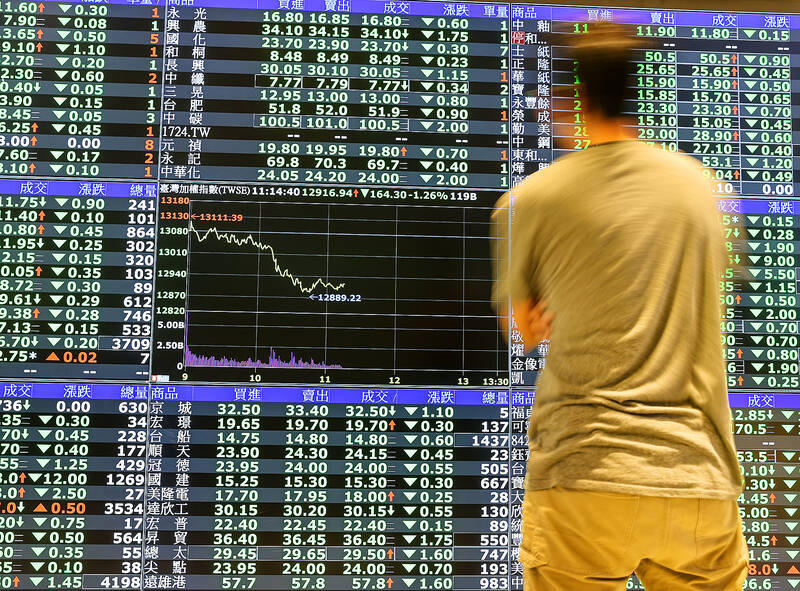Traders will from today be barred from short-selling 152 stocks after the Financial Supervisory Commission on Friday said it would tighten a short-selling ban.
The commission said it would keep a close eye on the local stock markets today and see whether investors’ confidence has been restored, the Central News Agency reported yesterday, citing an unnamed commission official.
Taiwanese shares are expected to find some respite this week after US stocks moved higher on Friday as investors priced in comments by US Federal Reserve officials that the central bank might slow the pace of rate hikes in December, equity strategists said.

Photo: CNA
The TAIEX dropped 126.9 points, or 0.98 percent, to close at 12,819.2 on Friday, posting a weekly decline of 2.35 percent, from 13,128.12 on Oct. 14, Taiwan Stock Exchange data showed.
Data compiled by the Securities and Futures Bureau showed that 105 stocks on the Taiwan Stock Exchange and 47 stocks on the Taipei Exchange dropped 3.5 percent or more on Friday, which makes them subject to the regulator’s expanded short-selling ban when the local markets open today.
The commission said in a statement on Friday that investors would not be able to short-sell stocks at a price lower than the previous close if shares drop more than 3.5 percent the previous session, effective immediately.
Securities houses and futures traders that conduct short sales for hedging purposes would not be covered by the latest ban, the commission said.
The local equities have fluctuated significantly in the past few weeks, affected by the volatility of US bond yields and US stocks, Allianz Global Investors Taiwan Ltd (安聯投信) said in a note.
As the outlook for corporate earnings remains mixed and mainstream stocks on the local markets apparently lost momentum, investors are advised to be cautious about Taiwanese equities in the near term, Allianz Taiwan’s equity research team said.
At present, investors might favor stocks that have stable cash flows and strong business fundamentals, or switch to stocks that have relatively lower valuation and growth potential, Allianz said.
In addition, counter-cyclical stocks and those that might benefit from post-COVID-19 pandemic pent-up demand might also gain momentum, it added.

Three experts in the high technology industry have said that US President Donald Trump’s pledge to impose higher tariffs on Taiwanese semiconductors is part of an effort to force Taiwan Semiconductor Manufacturing Co (TSMC, 台積電) to the negotiating table. In a speech to Republicans on Jan. 27, Trump said he intends to impose tariffs on Taiwan to bring chip production to the US. “The incentive is going to be they’re not going to want to pay a 25, 50 or even a 100 percent tax,” he said. Darson Chiu (邱達生), an economics professor at Taichung-based Tunghai University and director-general of

Hon Hai Precision Industry Co (鴻海精密) is reportedly making another pass at Nissan Motor Co, as the Japanese automaker's tie-up with Honda Motor Co falls apart. Nissan shares rose as much as 6 percent after Taiwan’s Central News Agency reported that Hon Hai chairman Young Liu (劉揚偉) instructed former Nissan executive Jun Seki to connect with French carmaker Renault SA, which holds about 36 percent of Nissan’s stock. Hon Hai, the Taiwanese iPhone-maker also known as Foxconn Technology Group (富士康科技集團), was exploring an investment or buyout of Nissan last year, but backed off in December after the Japanese carmaker penned a deal

WASHINGTON POLICY: Tariffs of 10 percent or more and other new costs are tipped to hit shipments of small parcels, cutting export growth by 1.3 percentage points The decision by US President Donald Trump to ban Chinese companies from using a US tariff loophole would hit tens of billions of dollars of trade and reduce China’s economic growth this year, according to new estimates by economists at Nomura Holdings Inc. According to Nomura’s estimates, last year companies such as Shein (希音) and PDD Holdings Inc’s (拼多多控股) Temu shipped US$46 billion of small parcels to the US to take advantage of the rule that allows items with a declared value under US$800 to enter the US tariff-free. Tariffs of 10 percent or more and other new costs would slash such

‘LEGACY CHIPS’: Chinese companies have dramatically increased mature chip production capacity, but the West’s drive for secure supply chains offers a lifeline for Taiwan When Powerchip Technology Corp (力晶科技) entered a deal with the eastern Chinese city of Hefei in 2015 to set up a new chip foundry, it hoped the move would help provide better access to the promising Chinese market. However, nine years later, that Chinese foundry, Nexchip Semiconductor Corp (合晶集成), has become one of its biggest rivals in the legacy chip space, leveraging steep discounts after Beijing’s localization call forced Powerchip to give up the once-lucrative business making integrated circuits for Chinese flat panels. Nexchip is among Chinese foundries quickly winning market share in the crucial US$56.3 billion industry of so-called legacy